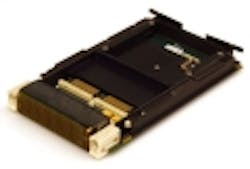Aeroflex announces new 32 and 40 megabit SRAM multi-chip module memories
Posted by John McHaleCOLORADO SPRINGS, Col., 12 June 2010. Aeroflex Colorado Springs announced production of its UT8ER1M32 (32-megabit) and the UT8R1M39 (40-megabit) HiRel SRAM multi-chip module (MCM) memories. Leveraging its 16M/20M Monolithic SRAM, Aeroflex created six new SRAM MCMs using a single universal 132 CQFP (ceramic quad flatpack) with the 32-megabit and 40-megabit being its first production products.The UT8ER1M32 employs embedded EDAC (error detection and correction) with user programmable auto scrubbing options and 20-nanosecond access time. For designs using external system EDAC controllers, Aeroflex offers the UT8R1M39 SRAM MCM.Using a universal 132-lead package which integrates as many as eight 16M or 20M memory die, Aeroflex's latest SRAM MCMs allow for increased memory density with limited system impact. Memory densities range from 32-megabit to 128-megabit and 40-megabit to 160-megabit. MCM packaging technology has been used in the avionics and commercial industry for many years and it is used in high-reliability (hi-rel) applications to reduce board area component count and overall electronic effectiveness.With 20-nanosecond access time and 1.8-volt core voltage, the SRAM MCMs offer low power consumption, fast access time, a Standard Microcircuit Drawing (SMD) procurement vehicle for guaranteed quality, reliability, and operating performance. Both products are radiation-hardened with 100 kilorad(Si) total dose operational environment and are single event latchup (SEL) immune to 111Mev-cm2/mg. The 20-nanosecond access time of the Aeroflex SRAMs allows for zero wait-state interface to today's leading edge 32-bit microprocessors, simplifying design complexity, company officials say. It is used for data and instruction memory, as well as small instrument and telemetry acquisition systems."Aeroflex has been producing hi-rel memories for harsh environments for more than 25 years," says Anthony Jordan, director-standard products. As a fab-independent supplier, we can design and develop leading-edge products built in state-of-the-art wafer manufacturing facilities."Another advantage to our customers is our memory packaging roadmap," Jordan continues. "We have taken our customer's needs for various memory sizes (density and organization) and provided them a variety of package options, such as flatpack, MCM, and high-density chip stacking technology. Again, Aeroflex has gone to great lengths to provide solutions and worked side-by-side with customers to solve their packaging problems."The UT8ER1M32 and UT8R1M39 are QML qualified with procurement through a Standard Microcircuit Drawing. Prototypes and production are available now. The UT8R1M39 is $3,568, QML Q, in lots of 100. The new 64 to 160Mbit SRAM MCMs will be available as prototypes in 1H2011.For more information, visit www.aeroflex.com/memories.

